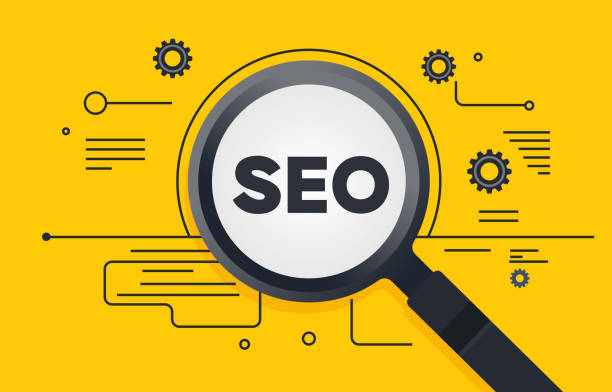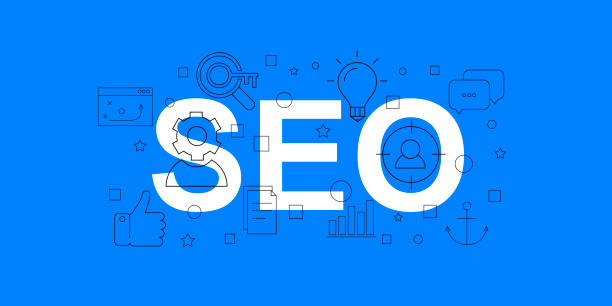An Introduction to the Dynamic World of SEO and Its Importance

In today’s highly competitive world, merely having an online presence is not enough; visibility and audience attraction are vitally important.
This is where Search Engine Optimization (SEO) plays a pivotal role.
#SEO is a #systematic and #continuous approach to improve your website’s ranking in organic search engine results like Google.
This process does not only involve keywords but encompasses a wide range of techniques, from improving the site’s technical structure to producing valuable content and acquiring credible backlinks.
Without a strong SEO strategy, even the best websites may get lost among the vast amount of digital information.
The main goal of SEO is to increase organic and targeted traffic to your website, which ultimately leads to increased brand awareness, attracting potential customers, and business growth.
It is a specialized and analytical process that requires a deep understanding of search engine algorithms and user behavior.
Does your current website build the trust that potential customers should have in your business? If the answer is no, it’s time to have your professional and influential corporate website with Rasaweb.
✅ Fully customized design tailored to your brand identity
✅ Increased lead generation and business credibility in the eyes of customers⚡ Contact us for a free consultation!
Types of SEO and Their Key Differences

SEO is generally divided into three main sections, each covering different aspects of website optimization: On-Page SEO, Off-Page SEO, and Technical SEO.
On-Page SEO includes all optimizations performed within your website itself, such as optimizing keywords in content, titles, meta descriptions, and URL structure.
This section is directly related to the quality of content and its presentation.
In contrast, Off-Page SEO refers to activities outside your website that increase your domain’s credibility and authority, the most prominent of which is Link Building.
Every quality backlink from a reputable site sends a positive signal to search engines.
Finally, Technical SEO focuses on improving the website’s technical infrastructure to enhance its crawlability and indexability by search engines, as well as improving user experience. Issues such as site loading speed, mobile compatibility, and standard data structures fall into this category.
Understanding the differences and importance of each of these sections is crucial for a comprehensive SEO strategy.
These explanations are provided in an educational and explanatory manner to offer a comprehensive view of the various dimensions of search engine optimization.
Success in SEO requires a harmonious and integrated approach between these three sections.
The Role of Keywords in a Comprehensive SEO Strategy

Keyword research is the backbone of any successful SEO campaign.
This process involves identifying words and phrases that your target audience uses in search engines to find products, services, or information related to your business.
Accurate keyword research not only helps you produce relevant and user-needed content but also provides deep insight into their #search_intent.
Keywords can vary in search volume, competition, and user intent type (informational, commercial, navigational).
Using keyword research tools like Google Keyword Planner, Ahrefs, or Semrush is essential for discovering new keywords and analyzing competitors.
Long-Tail Keywords, despite lower search volume, often have higher conversion rates and less competition, making them excellent opportunities for targeted traffic.
To achieve high rankings in search results, you must strategically incorporate keywords into your titles, meta descriptions, body content, and even image names and URLs.
This section is a guiding and specialized explanation for better understanding this vital element in SEO.
| Keyword Type | Definition | Example | SEO Goal |
|---|---|---|---|
| Short-Tail Keywords | Short and general phrases, with high search volume and strong competition. | “SEO”, “Digital Marketing” | Increase brand awareness, general traffic |
| Long-Tail Keywords | Longer and more specific phrases, with lower search volume and less competition. | “Best SEO methods in 2024”, “How to build strong backlinks” | Attract targeted traffic, high conversion rates |
| Question Keywords | Phrases formulated as questions. | “What is SEO?”, “How to SEO my site?” | Answer user questions, produce engaging content |
| Geographic Keywords (Local) | Phrases that include a specific city or region name. | “SEO company in Tehran”, “Website design Isfahan” | Attract local customers, Local SEO |
Producing Quality Content, the Beating Heart of SEO

Content is king, and in the world of SEO, this statement holds true more than ever.
Producing high-quality, unique, and valuable content for users is one of the most important ranking factors in search engines.
Your content should not only include relevant keywords but also answer user questions, provide in-depth information, and engage them.
Search engines are becoming increasingly smarter and are capable of detecting content quality and its relevance to user intent.
This content can include blog articles, explanatory guides, videos, infographics, and even entertaining content that indirectly addresses user needs.
Writing comprehensive content that covers a topic from various angles (Pillar Content) can help improve your ranking for a wide range of related keywords.
Furthermore, optimizing content for readability and user experience (UX) through the use of subheadings, lists, and short paragraphs is also crucial.
Producing engaging content can encourage users to interact more and spend longer on your site, which itself is a positive signal for search engines and significantly helps improve SEO.
Does your current corporate website not reflect your brand’s credibility and strength as it should? Rasaweb solves this challenge for you with professional corporate website design.
✅ Increased visitor credibility and trust
✅ Targeted attraction of more customers
⚡ Click for a free consultation!
Effective and Powerful Link Building Strategies

Link building, or acquiring backlinks, is one of the main pillars of Off-Page SEO and plays a vital role in increasing your website’s Domain Authority and ranking.
Backlinks act as a “vote of confidence” from other websites to your site.
The more high-quality and relevant backlinks you have, the more credible and trustworthy Google perceives your site to be.
Link building strategies should focus on quality, not quantity.
Natural and relevant links are far more valuable than spammy or irrelevant ones.
Some effective link-building methods include: producing highly valuable content that naturally attracts links (link bait), guest blogging on relevant blogs, participating in online forums, using reputable directories, and broken link building.
It should be noted that buying links or using Private Blog Networks (PBNs) can lead to severe penalties from Google.
Therefore, an ethical and sustainable approach to link building is crucial.
To improve your site’s SEO, you should continuously look for opportunities to acquire quality backlinks.
This is an analytical and specialized process that requires patience and meticulous planning.
Proper link building helps you to be recognized by search engines as a credible and reliable information source.
Technical Site Optimization to Enhance SEO Performance

Technical SEO is often overlooked but forms the foundation of a healthy and successful website from an SEO perspective.
This section includes optimizations that help search engines easily crawl and index your website.
Site loading speed is one of the most crucial technical factors; slow sites provide a poor user experience and are penalized by Google.
Using tools like Google PageSpeed Insights is essential for identifying issues and improving speed.
Mobile-Friendliness is also highly important, as most searches today are conducted via mobile devices, and Google has adopted a Mobile-First Indexing approach.
Other aspects of technical SEO include optimizing URL structure, using XML Sitemaps to help search engines discover all pages, creating a Robots.txt file to manage crawler access, implementing Structured Data to display Rich Snippets in search results, and fixing 404 errors and 301 redirects.
A technically optimized website, in addition to improving its SEO ranking, also provides a better user experience, which indirectly positively impacts SEO.
This is a purely specialized and explanatory part of website optimization.
Essential SEO Tools and How to Use Them

To succeed in SEO, using the right tools is crucial.
These tools help you monitor your website’s performance, discover new keywords, analyze competitors, identify technical issues, and track your progress.
Google Search Console (GSC) is a free and essential tool from Google that provides vital information about how Google views your site, the keywords for which you rank, crawling and indexing issues, and overall website performance in search results.
Google Analytics is also a free tool for analyzing website traffic, user behavior, traffic sources, and conversion rates.
Paid and more advanced tools like Semrush, Ahrefs, and Moz Pro also provide a comprehensive set of features, including advanced keyword research, backlink analysis, competitor analysis, rank monitoring, and site health checks.
Choosing the right tool depends on your budget and specific needs, but a combined use of free and paid tools can give you a comprehensive and analytical view of your website’s SEO status.
Learning to use these tools is an important educational part of your SEO journey, helping you to make data-driven decisions and optimize your strategies.
| Tool Name | Type | Main Uses | Description |
|---|---|---|---|
| Google Search Console (GSC) | Free | Monitoring performance in Google, identifying crawl errors, checking index, keyword display | Official Google tool for website owners |
| Google Analytics | Free | Website traffic analysis, user behavior, traffic sources, conversion rates | Comprehensive tool for analyzing user behavior and site statistics |
| Semrush | Paid (limited free version) | Keyword research, competitor analysis, backlink analysis, site health check, ad analysis | One of the most powerful comprehensive SEO and digital marketing tools |
| Ahrefs | Paid | Backlink analysis, keyword research, content analysis, site health check, rank monitoring | Known as the largest backlink database in the world |
| Google PageSpeed Insights | Free | Website loading speed check, optimization suggestions | A tool for improving technical site performance |
Measuring and Analyzing SEO Results for Continuous Improvement

Implementing an SEO strategy without measuring and analyzing results is like shooting in the dark.
To ensure the effectiveness of your efforts and identify strengths and weaknesses, you must regularly track your website’s performance.
Key metrics for measuring SEO success include: Organic Traffic, Keyword Rankings, Bounce Rate, Time on Page, Conversion Rate from organic traffic, and Domain Authority.
Using tools like Google Analytics and Google Search Console is essential for collecting this data.
Analyzing this data helps you gain a deeper understanding of user behavior and how they interact with your content.
For example, if the bounce rate is high, it may indicate that your content does not correctly address the user’s search intent or that there is an issue with the site’s user experience.
This is an analytical and educational process that allows for continuous optimization and improvement of your SEO strategies.
SEO optimization is not a one-time project, but a continuous and dynamic process that requires constant monitoring and adjustment based on data and changes in Google’s algorithms.
Are you frustrated with your e-commerce site’s low conversion rate? Rasaweb transforms your e-commerce site into a powerful tool for attracting and converting customers!
✅ Significant increase in visitor-to-buyer conversion rate
✅ Unparalleled user experience to boost customer satisfaction and loyalty⚡ Get free consultation from Rasaweb!
Future SEO Trends and Preparing for Them

The world of SEO is constantly evolving, and search engine algorithms are continuously updated.
To stay ahead of the competition, it’s necessary to be aware of future SEO trends and prepare for them.
One of the most important future trends is Voice Search.
With the expansion of voice assistants like Siri and Google Assistant, the way users search has changed, shifting towards more conversational language.
This affects keyword selection and content structure.
Artificial intelligence and machine learning also play an increasing role in SEO, as algorithms like Google’s RankBrain and BERT are capable of better understanding user search intent and the contextual meaning of content.
Therefore, producing comprehensive and high-quality content that effectively answers potential questions becomes even more important.
Video SEO, Local SEO with a greater focus on Google Maps, and User Experience (UX) optimization are also crucial trends.
Google’s Core Web Vitals, as user experience measurement metrics, have become direct ranking factors.
By following news and analytical articles about SEO, you can stay informed about these changes, keep your strategy updated, and take steps towards SEO success.
Conclusion and the Importance of Continuous SEO Optimization

As you’ve seen, SEO is a broad and multifaceted discipline that includes on-page, off-page, and technical optimizations.
From keyword research and producing quality content to link building and technical website optimization, each of these elements plays a vital role in your online success.
But most importantly, SEO is a continuous and dynamic process.
The digital world and search engine algorithms are constantly changing, so your SEO strategy must also be flexible and regularly updated.
Monitoring performance, analyzing data, and adapting to new trends are key to maintaining and improving your website’s ranking in search results.
Investing in SEO not only means increased traffic and visibility but also means building a strong and stable foundation for your business’s digital presence.
This comprehensive guide was an effort to provide an overview of the importance and various dimensions of SEO.
By adhering to the principles explained and utilizing specialized knowledge, you can introduce your website to search engines and step onto the path of online success.
Frequently Asked Questions
| Question | Answer |
|---|---|
| What is SEO? | SEO, or Search Engine Optimization, is the process of increasing the quality and quantity of website traffic by improving the site’s ranking in organic search engine results like Google. |
| What are the main types of SEO? | SEO is divided into three main categories: On-Page SEO, Off-Page SEO, and Technical SEO. |
| What does On-Page SEO include? | On-Page SEO includes optimizing elements within the website, such as keywords, Title Tag, Meta Description, content, URL structure, images, and internal links. |
| What is Off-Page SEO? | Off-Page SEO refers to activities outside the website that help improve its ranking, such as Backlink Building, social media marketing, and Brand Mentions. |
| What is Technical SEO? | Technical SEO deals with optimizing the technical aspects of a website to help it be better crawled and indexed by search engines. This includes site speed, mobile-friendliness, site structure, Sitemaps, and Robots.txt file. |
| What role do Keywords play in SEO? | Keywords are the phrases users enter into search engines. Proper and targeted use of relevant keywords in content and site elements helps search engines understand the topic of your page and display it for relevant searches. |
| What is a Backlink and why is it important? | A backlink, or inbound link, is a link from one website to another. Backlinks act as a “vote of confidence” from other sites to your site for search engines and play an important role in the site’s credibility and ranking increase, especially if they are from reputable sites. |
| What is the impact of quality content on SEO? | Quality, relevant, comprehensive, and unique content not only attracts and retains users but also shows search engines that your page is valuable. This helps improve ranking, reduce Bounce Rate, and increase user time on site. |
| Why is site loading speed important for SEO? | Site loading speed is an important ranking factor for Google. Faster sites provide a better user experience, have a lower bounce rate, and are preferred by search engines. |
| Is SEO a one-time process? | No, SEO is a continuous and long-term process. Search engine algorithms are constantly changing, competition is increasing, and site content also needs updates. Therefore, SEO requires continuous monitoring, analysis, and optimization. |
And other services of Rasaweb Advertising Agency in the field of advertising
Smart Digital Advertising: A new service to increase customer acquisition through the use of real data.
Smart Advertising Campaign: An effective tool for digital branding with the help of marketing automation.
Smart Data Analysis: Professional optimization for campaign management using attractive UI design.
Smart Link Building: A professional solution for digital branding with a focus on precise audience targeting.
Smart Content Strategy: Designed for businesses seeking user engagement through attractive UI design.
And over hundreds of other services in the fields of internet advertising, advertising consultation, and organizational solutions
Internet Advertising | Advertising Strategy | Advertorial
Sources
What is SEO?
SEO Trends in 2024
Comprehensive Guide to Keyword Research
Technical SEO Checklist
🎯 To ensure your business reaches its peak in the digital world and has a powerful and influential presence, Rasaweb Afarin Digital Marketing Agency, with expertise in key areas such as user-friendly website design, Search Engine Optimization (SEO), and targeted advertising campaigns, smooths your path to growth.
📍 Tehran, Mirdamad Street, next to Bank Markazi, Kazerun Jonoubi Alley, Ramin Alley, No. 6




